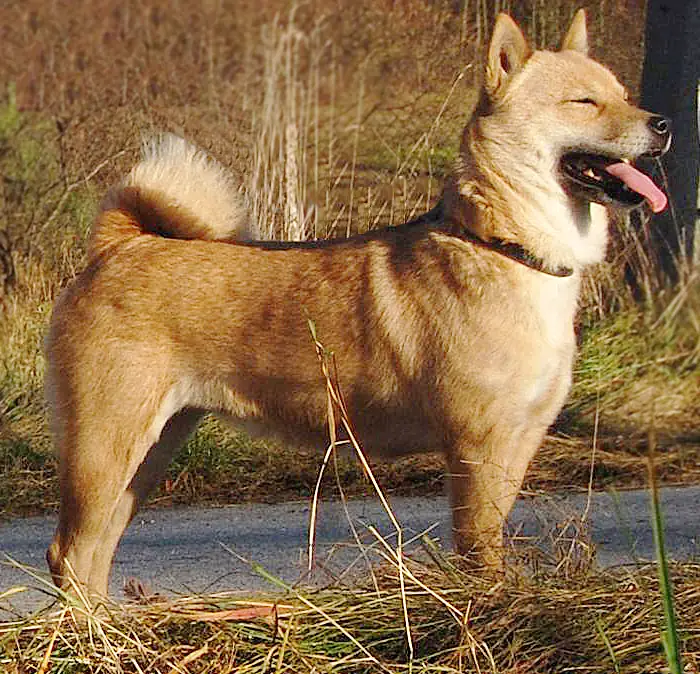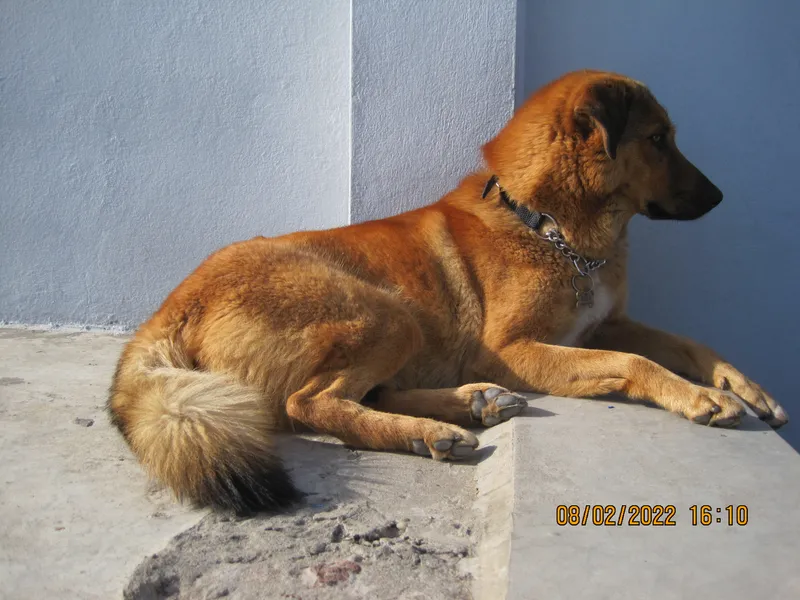Aidi
Also known as: Atlas Mountain Dog, Berber Dog, Chien de l'Atlas
The Aidi, or Chien de l'Atlas, is a medium-sized Moroccan breed known for its protective instincts and hunting capabilities. With a strong work drive and energetic nature, Aidis excel as livestock guardians and make loyal family companions.
⚡At a glance
🏆Best traits
Key Facts
Overview
🐕Breed Overview
✨Key Traits
💡What Makes Aidi Special
The Aidi's most defining traits include its bravery and strong protective instincts. This breed is known for its agility and ability to navigate rugged terrains, making it an ideal guardian in mountainous regions.
Their acute sense of smell allows them to excel in hunting and tracking activities. Aidis are also highly adaptable, capable of thriving in both rural and urban settings as long as they receive adequate exercise and mental stimulation.
Their loyalty and affectionate nature make them great companions for active families who can provide the structure they need.
The Aidi, also known as the Chien de l'Atlas, is a remarkable breed originating from Morocco, where it has served as a livestock guardian and hunting companion for centuries. With a history steeped in the traditions of the Berber tribes, the Aidi is known for its bravery, loyalty, and protective instincts. Standing between 20 to 25 inches tall and weighing around 50 to 55 pounds, this medium-sized dog boasts a lean, muscular build, covered by a thick, weather-resistant coat that comes in various colors, including white, black, and tawny.
The Aidi's temperament is characterized by its energetic and alert nature, making it an outstanding watchdog. While they are protective of their families and property, they require proper training and socialization from a young age to ensure they develop into well-rounded companions. Their intelligence and strong work drive make them suitable for various activities, including agility training, scent work, and herding exercises.
Despite their working origins, Aidis have become increasingly popular as family pets in Morocco and can adapt well to urban living, provided they receive adequate exercise and mental stimulation. Their unique blend of protective instincts and affectionate nature makes them a great fit for active families who can provide the structure and engagement they need. In summary, the Aidi is a versatile breed that excels in guarding, hunting, and companionship.
With their rich history and strong connection to Moroccan culture, they are not only remarkable working dogs but also loving family members. If you're considering adding an Aidi to your home, be prepared to invest time in training and socialization to help them thrive as a beloved companion.
🎉Fun Facts
Aidis are often staked around camps at night to protect against predators.
Despite its working origins, the Aidi has become increasingly popular as a family pet in Morocco.
The Aidi is known for its exceptional scenting ability, making it a valuable hunting companion.
The breed shares similarities with other mountain dog breeds, particularly in its guarding instincts.
Breed Characteristics
Family & Friends
Good Behavior
Get Up & Go
Household Harmony
Temperament & Personality
✨Key Traits
🐕Core Temperament
The Aidi is known for its courageous and protective temperament. They are highly alert and vigilant, making them excellent watchdogs.
While they can be reserved with strangers, they are affectionate and loyal to their families. Their energy levels are high, requiring regular exercise to keep them happy and healthy.
Aidis are intelligent and sensitive, making early training and socialization crucial for their development. They can be independent thinkers, so consistent training is important to establish boundaries and expectations.
💫Personality Profile
The Aidi is a breed characterized by its energetic and protective nature. They are known for their loyalty to their families and their strong instincts to guard their home and livestock.
Aidis are alert and ready for action, making them excellent watchdogs. While they can be reserved with strangers, they are affectionate and playful with their families.
Early socialization and training are essential to help them develop into well-rounded companions. Their intelligence and sensitivity require a patient and consistent approach to training, as they respond best to positive reinforcement methods.
🔊Vocal Tendencies
The Aidi has a moderate noise level, with a tendency to bark when alerting to strangers or potential threats. They may also bark during play or when seeking attention.
While they are not excessive barkers, their protective nature means they will vocalize when they perceive a need to guard their territory. Proper training and socialization can help manage their barking tendencies, ensuring they are well-behaved in various situations.
Affection & Social Traits
Warm and balanced socially — here’s how it shows up day to day.
Energy & Activity
Moderate, steady energy — great for matching your routine.
Communication Style
Moderately talkative — a quick read on noise at home.
Care Requirements
🏃♂️Exercise Requirements
Daily Exercise
The Aidi is an energetic breed that requires regular exercise to maintain its physical and mental well-being. Ideally, an Aidi should engage in at least 60 to 90 minutes of exercise daily, which can be broken down into multiple sessions. Activities such as brisk walks, running, and playtime in a secure area are essential.
The breed enjoys engaging in tasks that stimulate its natural instincts, such as herding games or scent work. Puppies should be introduced to exercise gradually, while adult dogs benefit from varied activities to keep them engaged. Senior Aidis may require less intense exercise but should still have daily walks to maintain their health.
Regular exercise helps prevent behavioral issues like boredom and anxiety, which can lead to destructive behaviors. Without sufficient exercise, Aidis may become restless, leading to increased barking or digging.
Preferred Activities
🏠Living & Adaptability
Space Requirements
The Aidi thrives in environments that provide ample space for exercise and exploration. While they can adapt to urban living, they do best in homes with large yards or access to open areas where they can run freely.
In smaller living spaces, it is crucial to ensure they receive enough physical activity and mental stimulation. Without adequate space and exercise, Aidis may exhibit signs of frustration or anxiety, leading to undesirable behaviors.
Climate Preference
🍲Feeding Guide
Schedule
Food Types
Portion Size
Special Nutritional Needs
Aidis may benefit from a diet rich in protein to support their active lifestyle. It's important to monitor their weight and adjust food portions accordingly to prevent obesity. Some Aidis may have food sensitivities, so introducing new foods gradually and observing for any adverse reactions is recommended.
✨Grooming Requirements
Grooming Overview
The Aidi has a thick, weather-resistant coat that requires regular grooming to keep it healthy and free of mats. Brushing once a week is typically sufficient to remove loose hair and prevent tangles.
During shedding seasons, more frequent brushing may be necessary. Bathing should be done as needed, usually every few months, to maintain coat cleanliness.
Regular nail trimming and ear cleaning are also essential to ensure overall hygiene. The Aidi's coat is surprisingly soft for an African breed, making grooming a pleasant experience for both the dog and the owner.
Care Schedule
Brush weekly; bathe every 2-3 months; trim nails every 2-4 weeks.
Health Profile
⚕️Health Care
Regular veterinary care is crucial for maintaining the Aidi's health and longevity. Routine check-ups, vaccinations, and preventive treatments can help detect and address health issues early.
Owners should also be vigilant about dental care, as dental diseases can impact overall health. Providing a balanced diet and regular exercise further supports their well-being throughout their life stages.
Health Issues Overview
⏳Average Lifespan
Genetic Factors
Genetics play a significant role in the Aidi's lifespan, with certain hereditary health issues being more prevalent in the breed. Responsible breeding practices that prioritize genetic diversity can help reduce the risk of inherited conditions. Potential owners should seek reputable breeders who conduct health screenings and prioritize the overall health of their breeding stock.
Living Conditions
The Aidi's lifespan can be influenced by various environmental factors, including living conditions, climate, and social interactions. Providing a stable and loving home environment, along with regular exercise and mental stimulation, can contribute to a longer lifespan.
Exposure to harsh weather conditions without proper shelter can negatively impact their health. Additionally, social interactions with family members and other pets can enhance their emotional well-being, promoting longevity.
🏥Common Health Issues
Hip Dysplasia
Warning Signs
🔬Diagnosis
Veterinarians typically diagnose hip dysplasia through physical examinations and X-rays.
💊Treatment
Weight management, physical therapy, and in severe cases, surgical intervention.
📝Management Tips
Maintain a healthy weight, provide joint supplements, and engage in low-impact exercises to support joint health.
Skin Allergies
Warning Signs
🔬Diagnosis
Diagnosis is usually made through skin examinations and allergy testing.
💊Treatment
Medications, topical treatments, and dietary changes.
📝Management Tips
Regular grooming, hypoallergenic diets, and avoiding known allergens can help manage symptoms.
🛡️Preventive Care
🔬Hip Evaluation
Hip Evaluation assesses the hip joints for dysplasia and other abnormalities, which is important for this breed due to its predisposition to hip issues.
📅 Every 1-2 years, starting at 2 years of age.
🔬Allergy Testing
Allergy Testing identifies specific allergens that may affect the Aidi, helping to manage skin conditions and sensitivities effectively.
📅 As needed, especially if symptoms arise.
Training
🧠Intelligence & Trainability
💪Work Drive
The Aidi has a strong work drive, stemming from its historical roles as a livestock guardian and hunting companion. This breed thrives when given tasks that engage their natural instincts, such as herding, scent tracking, or participating in dog sports.
Providing mental stimulation through puzzle toys or training exercises is essential for their well-being. Without sufficient engagement, Aidis may become bored and exhibit destructive behaviors.
Owners should aim to incorporate daily tasks or activities that challenge their minds and bodies to keep them fulfilled.
⚠️Training Considerations
The Aidi can exhibit behavioral challenges if not properly trained and socialized from a young age. Common issues include territorial aggression, especially towards strangers, and a strong prey drive that may lead to chasing smaller animals.
To mitigate these challenges, early socialization with various people, animals, and environments is crucial. Consistent training using positive reinforcement methods can help establish boundaries and reduce aggressive tendencies.
Providing mental stimulation through interactive toys and training exercises can also prevent boredom-related behaviors, such as digging or excessive barking.
📝Training Tips
Training an Aidi requires patience and consistency. Start with basic obedience commands, using positive reinforcement techniques to encourage desired behaviors.
Socialization is key; expose your Aidi to different environments, people, and other animals to foster a well-rounded temperament. Incorporate engaging activities that challenge their intelligence, such as scent work or agility training.
Be mindful of their independent nature; while they are intelligent, they may not always be eager to please. Keeping training sessions short and fun will help maintain their interest and enthusiasm.
History & Heritage
📜Origin Story
The Aidi, also known as the Chien de l'Atlas, originates from the mountainous regions of Morocco, where it has been utilized by Berber tribes for centuries. These dogs were bred to protect livestock from predators such as wildcats and to assist in hunting alongside the Sloughi, a sighthound known for its speed and agility.
The Aidi's lineage is believed to be linked to the pariah dog, sharing common ancestry with other ancient breeds. Over time, the Aidi has adapted to the rugged terrain of the Atlas Mountains, developing a strong, muscular build and a thick coat to withstand the harsh climate.
Despite its historical significance, the breed has faced challenges in recognition and preservation, leading to recent efforts by Moroccan enthusiasts to promote and protect the Aidi's heritage.
⏳Development History
The Aidi's history dates back to ancient North Africa, particularly in the regions of Morocco, Algeria, and Tunisia. Originally bred as a livestock guardian, the breed has evolved to serve multiple roles, including hunting and companionship.
The breed was first recognized under the name 'Atlas Sheepdog' in 1963, but this was corrected in 1969 to reflect its true purpose. The Aidi's development has been influenced by its harsh environment, leading to a robust and resilient breed capable of withstanding the challenges of the Atlas Mountains.
Despite its working origins, the Aidi has become more popular as a family pet in Morocco, showcasing its adaptability to various living situations.
🛡️Purpose & Historical Role
The Aidi was primarily bred for guarding livestock, serving as a protector against predators and intruders. Its keen sense of smell and agility made it an effective hunting companion, often working alongside the Sloughi to track and capture game.
Historically, the breed was staked around nomadic camps to deter threats during the night. While the Aidi has been primarily a working dog, it has also found a place as a family companion, adapting to various roles in modern society.
🏺Cultural Significance
The Aidi holds a significant place in Moroccan culture, particularly among the Berber tribes. Historically, these dogs have been essential for protecting livestock and property from predators, showcasing their bravery and loyalty.
The breed's role as a guardian has made it a respected companion among nomadic tribes, although it has not always been held in high esteem compared to the more noble Sloughi. In recent years, efforts have been made to preserve the breed's purity and promote its versatility as a working dog and companion.
The Aidi's unique characteristics and historical importance contribute to its cultural significance in Morocco and beyond.
Conservation Status
The breed exists today and isn’t classified as extinct.
Less widespread; more likely to be region-specific or niche.
This breed is less common but has stable populations in certain regions.
?Frequently Asked Questions
Is the Aidi good for apartment living?
The Aidi may struggle with apartment living. They typically need more space and a yard to expend their energy. If you live in an apartment, you would need to commit to extensive daily exercise and outdoor time to keep this breed happy.
How much does a Aidi shed?
The Aidi has a moderate shedding level. You can expect some hair around the house, especially during seasonal changes. Regular brushing a few times per week will help keep shedding under control.
Are Aidis easy to train?
The Aidi can be moderate when it comes to training. They can learn commands and routines with consistent effort, though they may sometimes show a stubborn streak. Patience, positive reinforcement, and regular practice sessions will yield the best results.
How long do Aidis live?
The average lifespan of a Aidi is 10 - 12 years. Lifespan can be influenced by genetics, diet, exercise, and overall health care. Regular veterinary check-ups and a healthy lifestyle can help your Aidi live a long and happy life.
Is the Aidi good with kids?
Yes, the Aidi generally does well with children. They are patient and affectionate, making them a solid family dog. As with any breed, supervision during interactions with young children is always recommended.
How much exercise does a Aidi need?
The Aidi is a high-energy breed that needs approximately 60 minutes of exercise daily. They thrive with vigorous activities such as running, hiking, or interactive games. Without adequate exercise, they may develop behavioral issues from pent-up energy.
Is the Aidi good with other pets?
The Aidi may struggle with other pets, particularly smaller animals. Their prey drive or territorial nature can make multi-pet households challenging. Careful introductions, training, and supervision are essential.









